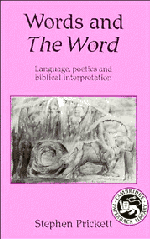3 - Poetry and prophecy
Published online by Cambridge University Press: 01 March 2011
Summary
The language of the Great Code
It is a historical commonplace that the course of Western thought since the Renaissance has been one of progressive secularization, but it is easy to mistake the way in which that process took place. Secular thinkers have no more been able to work free of the centuries-old Judeo-Christian culture than Christian theologians were able to work free of their inheritance of classical and pagan thought. The process – outside the exact sciences at any rate – has not been the deletion and replacement of religious ideas but rather the assimilation and reinterpretation of religious ideas, as constitutive elements in a world view founded on secular premises.
Abrams's theme is the gradual displacement of ‘traditional concepts, schemes, and values which had been based on the relation of the Creator to his creature and creation’ and their reformulation ‘within the prevailing two-tier system of subject and object, ego and non-ego, the human mind or consciousness and its transactions with nature’. The original ambiguity of Carlyle's phrase ‘Natural Supernaturalism’, poised between the divinization of nature and the naturalizing of the miraculous is conveniently resolved by making it the label for the latter. With the coming to consciousness of secular man, the emotions of awe and wonder previously invoked by the Creator are relocated in the created world – ‘to naturalize the supernatural and humanize the divine’.
- Type
- Chapter
- Information
- Words and The WordLanguage, Poetics and Biblical Interpretation, pp. 95 - 148Publisher: Cambridge University PressPrint publication year: 1986



